Energy storage facility opponents hold first meeting in Wendell
| Published: 10-25-2023 6:35 PM |
WENDELL — About 45 people convened at the Wendell Meetinghouse on Tuesday night to hear from members of the “No Assaultin’ Battery Citizens Committee,” a non-governmental entity opposing the 105-megawatt battery storage facility proposed for the center of town.
The newly formed group organized the public meeting to share its members’ concerns about the project announced in 2020. Various speakers took to the podium before the floor was opened to public comment, after which attendees broke off into groups to brainstorm solutions and report their ideas.
Court Dorsey, who serves as president of the Friends of the Wendell Meetinghouse but spoke as a concerned citizen, compared this project to the state’s plan to upgrade Route 2 through Wendell’s forests and Kinder Morgan’s proposal for a pipeline from Pennsylvania to the Massachusetts coast to export natural gas.
“And they all crossed paths with David here in Wendell, here in western Mass.,” Dorsey said referring to the Biblical underdog in the Old Testament’s Book of Samuel. He also reminded everyone of Margaret Mead’s heed to never doubt that a small group of thoughtful citizens can change the world, because it is the only thing that ever has.
Proposed by Lowell-based New Leaf Energy, a standalone business of Borrego Energy, the Wendell Energy Storage Project has been in development since 2020. According to New Leaf Energy’s project website, it is sited strategically adjacent to existing electrical infrastructure and is an optimal location for new energy infrastructure.
The proposal is to construct at 105-megawatt battery storage facility at 68 Wendell Depot Road. Anna Gyorgy, who sits on the new committee, said the project would disturb 50 acres of forest and clear-cut 11.1 acres to install 25-foot walls and constant air-conditioning to protect 786 lithium-ion batteries. New Leaf Energy’s project website states the total limit of work would be 11.1 acres, with 6.5 acres developed for the battery and step-up infrastructure.
Because of the noise disruption to wildlife, the Wendell Conservation Commission refused to permit the project. However, in January 2023, New Leaf applied to the state Department of Public Utilities for a permit to proceed.
According to New Leaf Energy’s project website, the site will be monitored remotely around the clock. The battery energy storage system will enhance the flexibility and reliability of the electric grid without creating emissions or waste products, the company states.
Article continues after...
Yesterday's Most Read Articles
“The project will charge the batteries from power supplied by the electric grid during times of ample system supply, usually aligned with the time when solar and wind energy resources are generating electricity,” the website states. “The project will then dispatch the electric power back onto the electric grid during times of peak demand, allowing grid operators to avoid calling on the dirtiest fossil fuel resources for additional generation that might be needed to meet customer demand.”
Bill Stubblefield, a noted local environmentalist involved with the Wendell State Forest Alliance, said there are already five other similar projects proposed, with two already having been approved.
“This isn’t only a Wendell problem,” he said. “It’s an ecological catastrophe and it’s a climate negative.”
Molly Doody, chair of the Wendell Planning Board, said she spoke with New Leaf Energy project developer Eric Weinstein, who confirmed the company is waiting to hear back from the state Department of Public Utilities regarding the timing of public hearings. She assured the public she will be vigilant about staying in touch with Weinstein.
Doody also explained the state Attorney General’s Office rejected the town’s prohibition of standalone battery storage projects because it did not articulate evidence for why it is believed such sites negatively affect public health, safety and well-being. She mentioned standalone battery storage projects are considered structures related to solar and, therefore, fall under the same protection from prohibition against unreasonable regulation.
Jonathan von Ranson was the first member of the public to take the microphone to speak against the project, which he considers a power play by New Leaf Energy.
“A 6-acre battery installation sized to serve the energy demands of distant urban centers is being muscled into a small-town area of the state, where comparatively little energy gets used, and where nature still predominates,” he read from a prepared statement. “It’s a classic case of industrial sprawl — i.e. poor planning — and it’s at Wendell’s expense. The path the proposal took to get to this point reveals it as a classic power play, infuriating to many of us. To me, New Leaf couldn’t pay Wendell enough taxes to make this plan feel acceptable. On both environmental and political fairness grounds, I join arms with our Energy Committee in opposition to this project.”
Nina Keller then told her fellow citizens not to be fooled by flowery language.
“Batteries are lithium, highly toxic and highly flammable,” she said.
Keller also mentioned Gov. Maura Healey has not responded to her letters pertaining to this matter.
Jim Frank said he and his wife moved to town about a year ago and are delighted to call Wendell home. However, he said he wanted to play devil’s advocate and suggested companies select small towns for these projects because the land is cheaper than places such as abandoned shopping malls in larger cities. He respectfully suggested batteries might be a safe way to become energy independent. Dan Leahy, of the Wendell Open Space Committee, responded with an urging to do what is best for Earth.
“We need to rethink how we’re going to live on this planet,” Leahy said. “We’re in a frying pan in the boiling water right now, and it’s a crying shame.”
Doody, noting that she’s had three years to think about the proposed project, said she has no reason to trust corporations. She also mentioned Wendell has a volunteer fire department that might not be able to handle a disaster at the site.
After breaking off into brainstorming groups, attendees pitched ideas that included hiring an attorney, passing town ordinances to prohibit these types of projects and writing a letter to Gov. Healey.
Reach Domenic Poli at: dpoli@recorder.com or 413-930-4120.

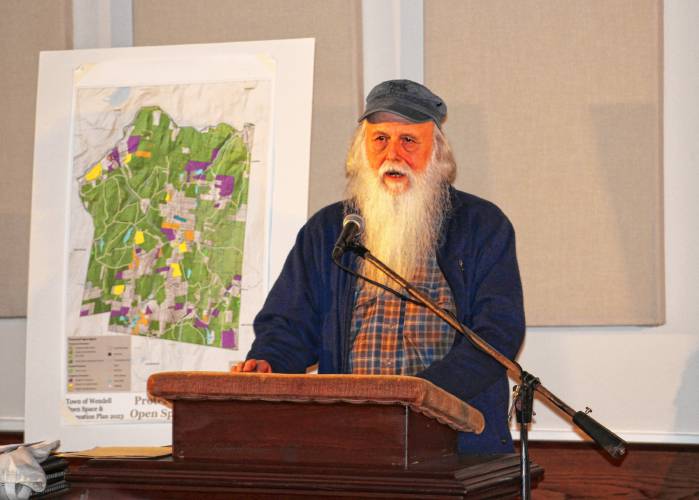
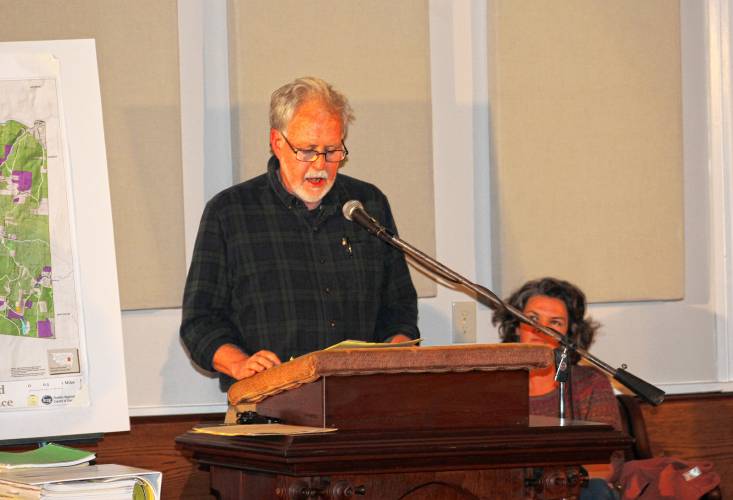
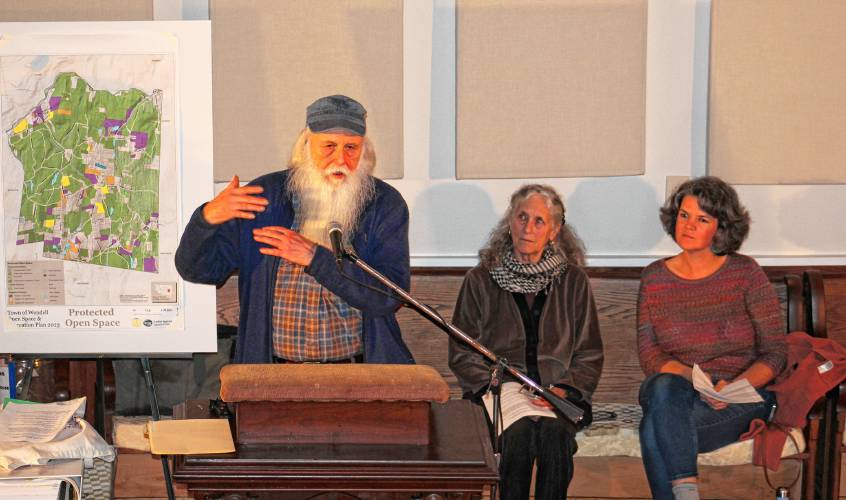
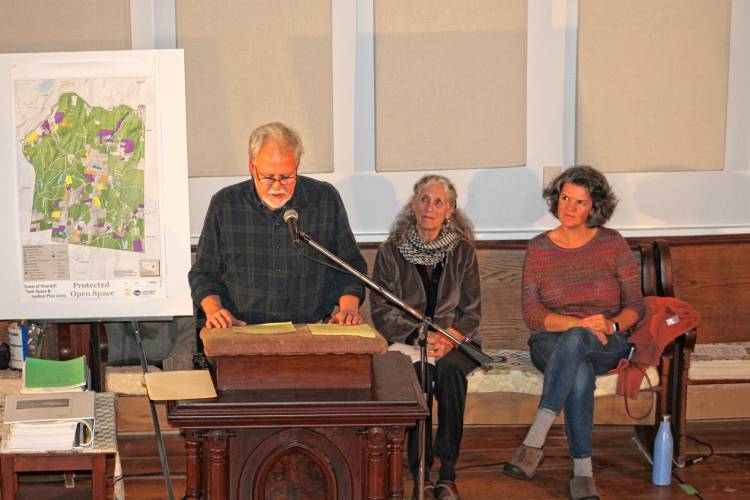
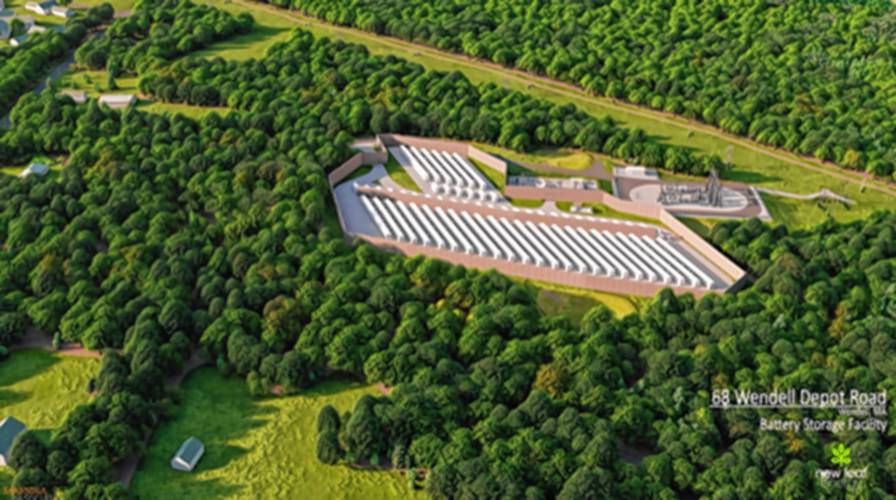
 Heath native’s bill honoring fallen heroes introduced in Congress
Heath native’s bill honoring fallen heroes introduced in Congress Greenfield Notebook: May 9, 2024
Greenfield Notebook: May 9, 2024 Heath voters OK $1.6M town budget, school spending
Heath voters OK $1.6M town budget, school spending  New USDA offices in Greenfield to aid staffing increase, program expansion
New USDA offices in Greenfield to aid staffing increase, program expansion
